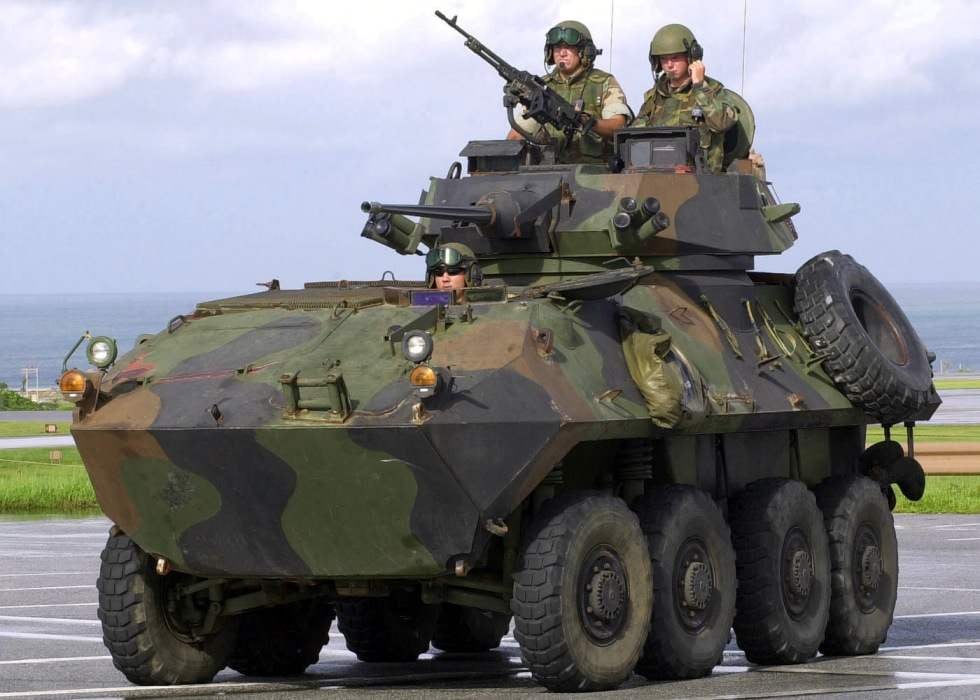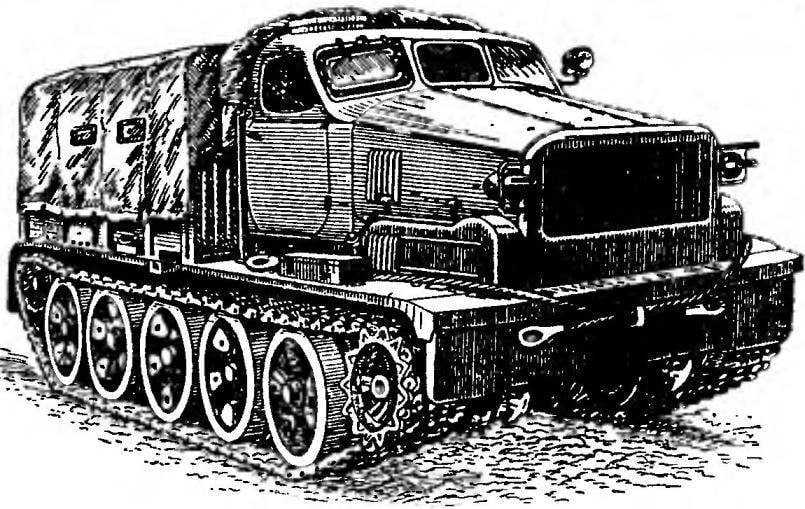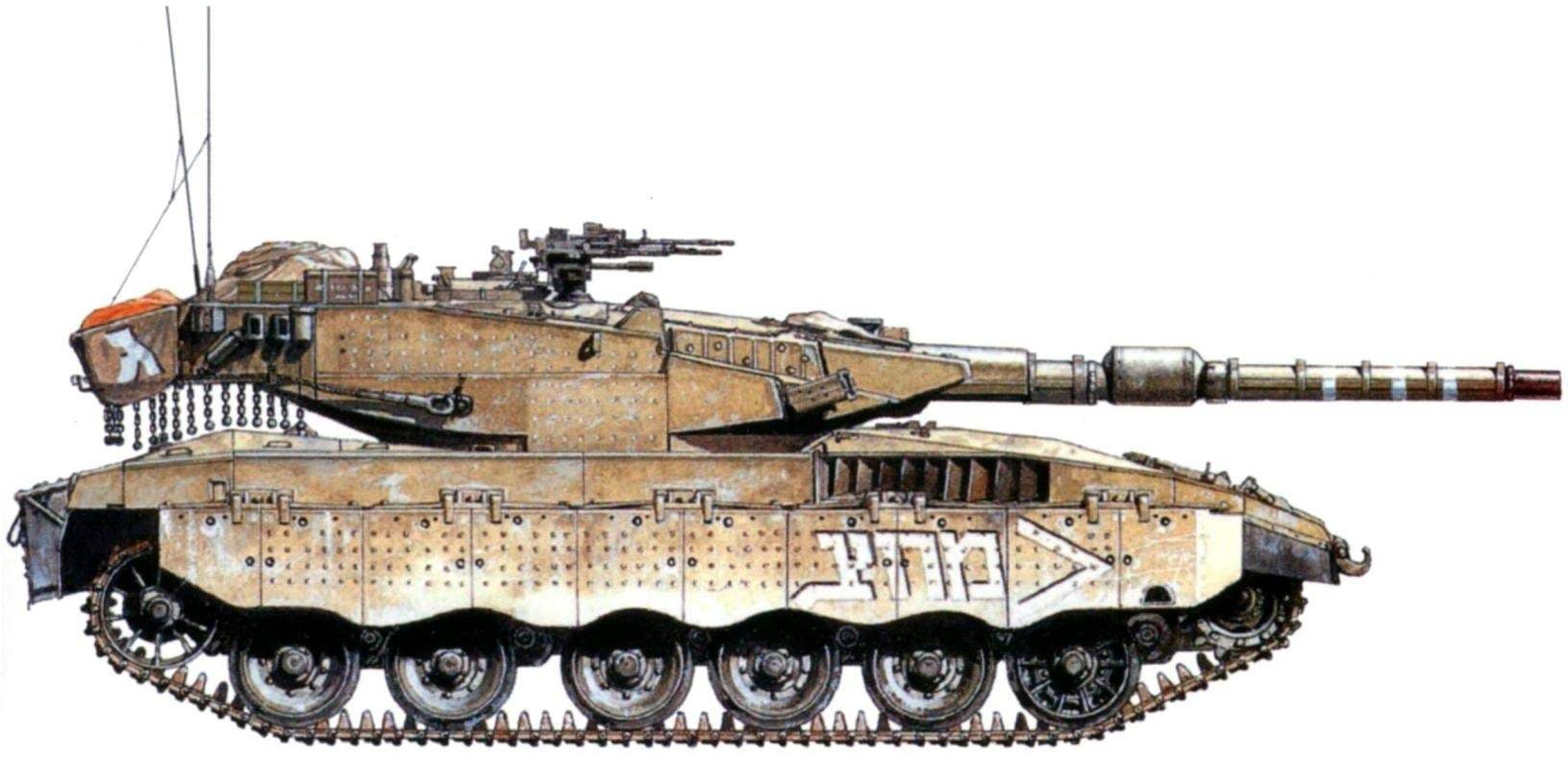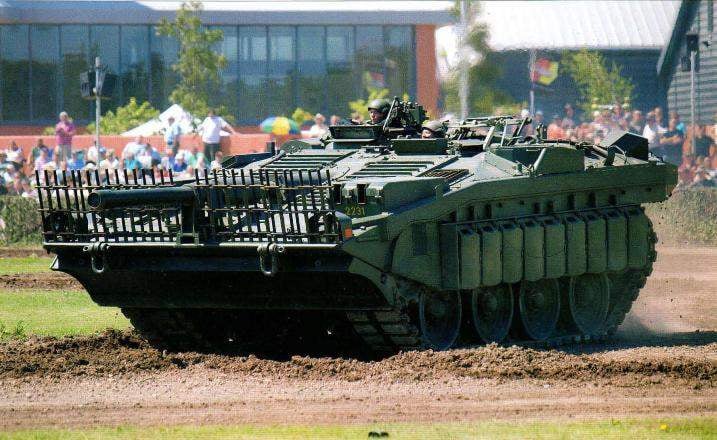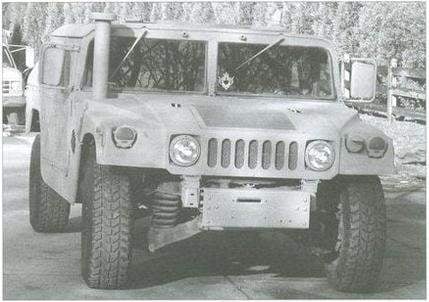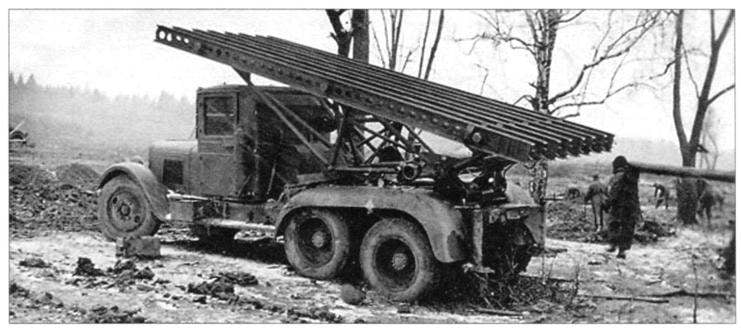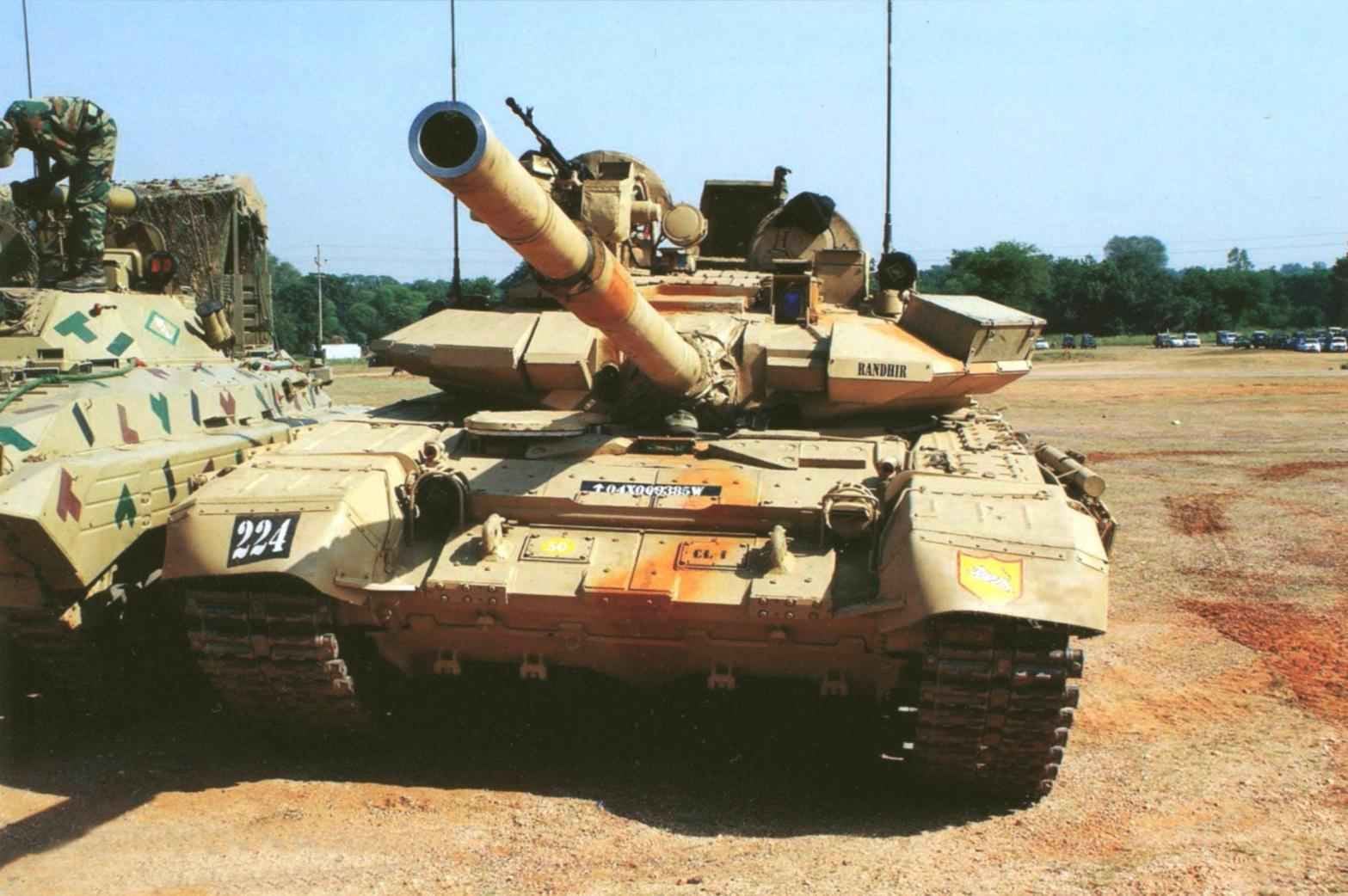 In recent years one of the most developing areas in the armor was the creation of vosmiklasnica machines wheel formula 8×8 with different weapons. These machines are more mobile in tactical combat, and less costly to operate and maintain, but worse armor, and have less combat power. Tracked them the “rivals” have more weight and often size, which affects the possibility of transfer of various vehicles, especially aircraft. Here at strategic mobility — benefit wheel designs.
In recent years one of the most developing areas in the armor was the creation of vosmiklasnica machines wheel formula 8×8 with different weapons. These machines are more mobile in tactical combat, and less costly to operate and maintain, but worse armor, and have less combat power. Tracked them the “rivals” have more weight and often size, which affects the possibility of transfer of various vehicles, especially aircraft. Here at strategic mobility — benefit wheel designs.
Armor
HEAVY ARTILLERY TRACTOR AT-T
 The designers of the Department of track-laying tractors (known as the Department of “200”) of the Kharkiv locomotive plant them. The Komintern (KhPZ) built in 1936 heavy artillery tractor “Voroshilovets” on the basis of the original, but irrational in the scheme, laborious to manufacture and maintain chassis. Later, in the design process of the T-34, they came to the conclusion that because of the proximity of the traction-weights, power, and mobility it is advisable to develop heavy trucks based on the chassis of a modern medium tanks. This unification was beneficial and production.
The designers of the Department of track-laying tractors (known as the Department of “200”) of the Kharkiv locomotive plant them. The Komintern (KhPZ) built in 1936 heavy artillery tractor “Voroshilovets” on the basis of the original, but irrational in the scheme, laborious to manufacture and maintain chassis. Later, in the design process of the T-34, they came to the conclusion that because of the proximity of the traction-weights, power, and mobility it is advisable to develop heavy trucks based on the chassis of a modern medium tanks. This unification was beneficial and production.
MERKAVA from ISRAEL
 According to the program of development of the armed forces of Israel military industry of the country by 1989 was able to create actually a new Merkava tank (Мегкаvа) MK.Z. The Lebanese campaign of 1982, in which machines “Merkava” MK.1 and “Merkava” MK.2 participated in the fighting, showed that they can still be amazed by the 125-mm projectiles the main of their opponent on the field of battle T-72 tank. Therefore, based on the concept of Israel’s military leadership “to protect the crew — above all”, once again at the forefront were put the problem of improving the tank’s protection. The designers used the new car an upgraded modular armour — steel packs-boxes with several layers of special armor inside. They are mounted with bolt connections to the surface of the machine, forming additional built-in dynamic protection of the so-called passive type. With the destruction of the module it can be easily replaced by another.
According to the program of development of the armed forces of Israel military industry of the country by 1989 was able to create actually a new Merkava tank (Мегкаvа) MK.Z. The Lebanese campaign of 1982, in which machines “Merkava” MK.1 and “Merkava” MK.2 participated in the fighting, showed that they can still be amazed by the 125-mm projectiles the main of their opponent on the field of battle T-72 tank. Therefore, based on the concept of Israel’s military leadership “to protect the crew — above all”, once again at the forefront were put the problem of improving the tank’s protection. The designers used the new car an upgraded modular armour — steel packs-boxes with several layers of special armor inside. They are mounted with bolt connections to the surface of the machine, forming additional built-in dynamic protection of the so-called passive type. With the destruction of the module it can be easily replaced by another.
SWEDISH MAIN BATTLE TANK

ARMORED CAR USA HUMMER
 After the First world war, the car confidently entered the arsenals of all armies, effectively replacing cavalry units and horse-drawn vehicles at the same time with the advantages of this type of technology was evident his shortcomings. So. military all over the world started talking about the unification of the army fleet. They wanted to have a universal chassis capable of small alterations to carry infantry units, may be used as a machine gun car, serve the mobile radio, light or sanitary staff van, towing artillery and chassis for armored car.
After the First world war, the car confidently entered the arsenals of all armies, effectively replacing cavalry units and horse-drawn vehicles at the same time with the advantages of this type of technology was evident his shortcomings. So. military all over the world started talking about the unification of the army fleet. They wanted to have a universal chassis capable of small alterations to carry infantry units, may be used as a machine gun car, serve the mobile radio, light or sanitary staff van, towing artillery and chassis for armored car.
FIGHTING VEHICLE BM-13 “KATYUSHA”

MAIN BATTLE TANK “TYPE 99” FROM CHINA
 In 2009, the global military community stirred the sensational interview of the Chinese General designer main battle tank “Type 99” Joo of Aishana. It stated that “China has set up a new tank “Type 99” among the ten tanks of the world occupies a leading position on three important indicators of combat potential of the firepower, mobility, protection, and it may be rivaled only by the German Leopard 2 and the American “Abrams”.
In 2009, the global military community stirred the sensational interview of the Chinese General designer main battle tank “Type 99” Joo of Aishana. It stated that “China has set up a new tank “Type 99” among the ten tanks of the world occupies a leading position on three important indicators of combat potential of the firepower, mobility, protection, and it may be rivaled only by the German Leopard 2 and the American “Abrams”.
T-64 – TANKS CHALLENGE NATO
 The Soviet T-34 tanks (recognized as the best medium tank of the Second world war) and KV (former the strongest in the world up to 1942), was a landmark armored fighting vehicles, pointing a way forward in post-war tank. German Colonel General Heinz Guderian in his books about tank operations in world war II appreciated the outstanding performance characteristics of the “thirty”: “In October 1941, I have described the advantage of the T-34 in front of our Pz.IV and resulted in conclusions which were to affect our future tank”.
The Soviet T-34 tanks (recognized as the best medium tank of the Second world war) and KV (former the strongest in the world up to 1942), was a landmark armored fighting vehicles, pointing a way forward in post-war tank. German Colonel General Heinz Guderian in his books about tank operations in world war II appreciated the outstanding performance characteristics of the “thirty”: “In October 1941, I have described the advantage of the T-34 in front of our Pz.IV and resulted in conclusions which were to affect our future tank”.
MAIN BATTLE TANK T-90
 The main drawback of T-72 tanks of all modifications, compared to other cars of the Soviet and foreign production of those years was the lack of an automated fire control system (FCS). In this regard, it was decided to conduct a deep modernization “semdesyatdvoyki.” This work took place under the theme “improving the T-72B” defined by the Council of Ministers of the USSR of June 19, 1986. The original design took place under the leadership of V. N. Venediktov, and after his 1987 retirement – under the leadership of new chief designer V. I. Potkin.
The main drawback of T-72 tanks of all modifications, compared to other cars of the Soviet and foreign production of those years was the lack of an automated fire control system (FCS). In this regard, it was decided to conduct a deep modernization “semdesyatdvoyki.” This work took place under the theme “improving the T-72B” defined by the Council of Ministers of the USSR of June 19, 1986. The original design took place under the leadership of V. N. Venediktov, and after his 1987 retirement – under the leadership of new chief designer V. I. Potkin.
THE MASS “SELF-PROPELLED GUN” OF THE GREAT PATRIOTIC
 An important component of the armored weapons of the red Army during the great Patriotic war was self-propelled artillery. As you know, the red Army did the heavy (SU-152, ISU-152 and ISU-122), medium (SU-122, SU-85 and SU-100) and light (SU-76 and SU-76M) self-propelled guns. The process of creating the latter was launched on 3 March 1942 after the formation of the special Bureau of self-propelled artillery. It was created on the basis of the 2nd Department of the NKTP (engineering), chief of which S. Ginsburg A., on starting from September, 1941, put forward proposals for an assault and anti-aircraft self-propelled gun on the basis of outdated and light tanks.
An important component of the armored weapons of the red Army during the great Patriotic war was self-propelled artillery. As you know, the red Army did the heavy (SU-152, ISU-152 and ISU-122), medium (SU-122, SU-85 and SU-100) and light (SU-76 and SU-76M) self-propelled guns. The process of creating the latter was launched on 3 March 1942 after the formation of the special Bureau of self-propelled artillery. It was created on the basis of the 2nd Department of the NKTP (engineering), chief of which S. Ginsburg A., on starting from September, 1941, put forward proposals for an assault and anti-aircraft self-propelled gun on the basis of outdated and light tanks.
